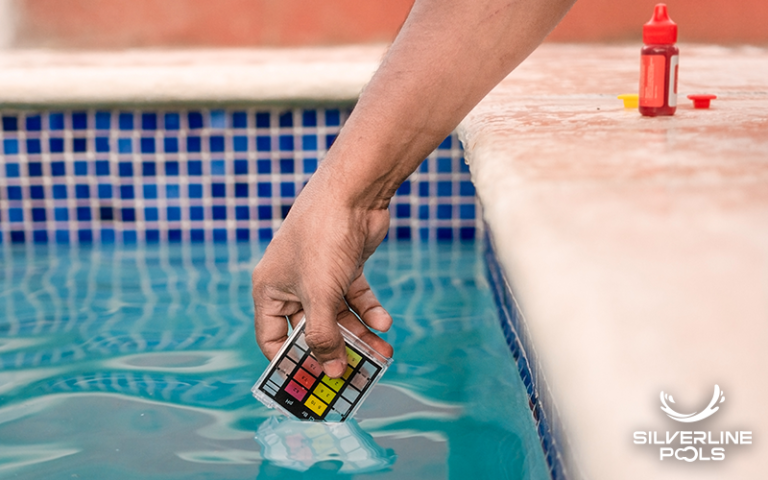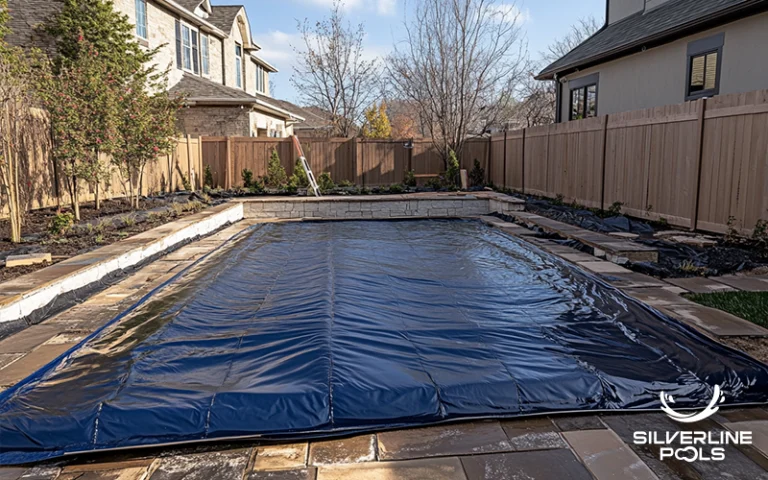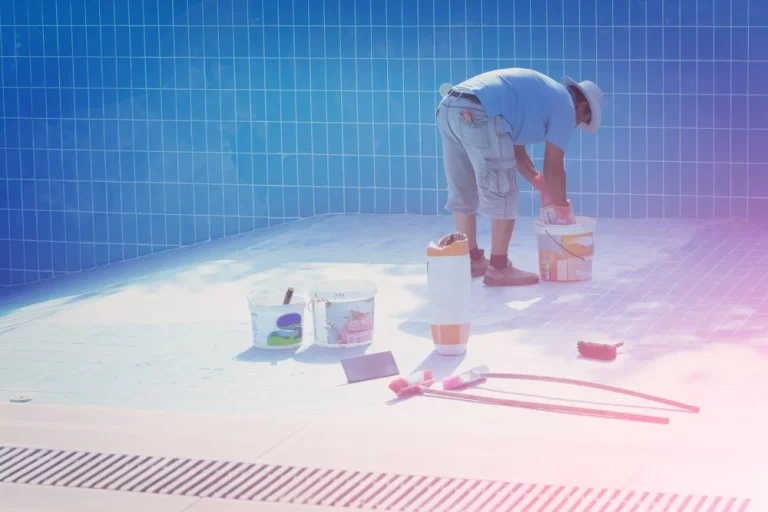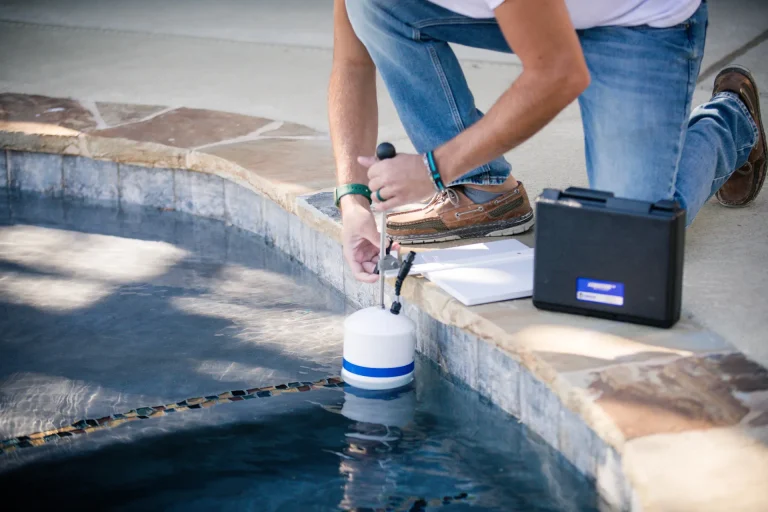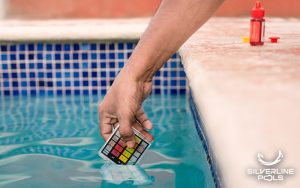Swimming pool chemicals keep pool water clean and bacteria-free. Pool owners often wonder about choosing the best pool sanitizer. While chlorine remains the popular choice, bromine has its advantages too. Understanding the key differences between these two sanitizers is crucial for maintaining a clean, healthy, and enjoyable pool.
This blog is your guide for choosing the right sanitizer between chlorine and bromine. It covers a detailed comparison of chlorine and bromine, their pros and cons, and their ideal levels as pool sanitizers. If you plan on switching from chlorine to bromine with safety, this blog is for you.
What is pool chlorine?
Pool chlorine is the most strong and effective sanitizer. Most pool owners prefer pool chlorine for pool sanitation as it cleans your pool within hours. It kills bacteria in swimming pools and drinking water. It has a strong odor and is easily available. Pool chlorine is available as:
- Pool chlorine tablets
- Pool chlorine powder (granular chlorine)
- Pool chlorine liquid
- Pool chlorine gas
What is pool bromine?
Bromine is a chlorine alternative that sanitizes, oxidizes, and algaecide pool water. Hot tub and spa owners prefer bromine over chlorine because it works efficiently at hot temperatures. Pool bromine is available in granules or tablets.
Chlorine vs. bromine: what’s the difference?
The following table shows key differences between chlorine and bromine based on different features.
| Features | Chlorine | Bromine |
| Water Transparency | It kills bacteria and removes organic debris, such as body oils. | It also kills bacteria but is slow. |
| Shock Treatment | It acts both as a sanitizer and an oxidizer. Add chlorine every alternate day for pool shock treatment, depending on pool usage and sanitizer level. | It acts only as a sanitizer. For pool shock, add bromine once a week. |
| Temperature | Chlorine is the best choice for unheated pools. It works efficiently below 65°F. | It remains stable at higher temperatures than chlorine, up to 100°F. It is mainly used in hot tubs and spas. |
| Sun Exposure | It is readily degraded when exposed to UV rays. Cyanuric acid helps prevent chlorine from breaking down too quickly in sunlight. | Bromine is also degraded when exposed to the sun. No chemical can stabilize it again once it has degraded. |
| Water Clarity | Clear | Cloudy |
Which to Choose: Bromine vs. Chlorine
Knowing the pros and cons is better when choosing between bromine and chlorine. Let’s explore the advantages and disadvantages of chlorine and bromine to help the owners select the best sanitizer for their pools.
1. Chlorine
Here are the pros and cons of using chlorine as your pool sanitizer:
Pros
- Cheaper than bromine.
- It is best suited for outdoor pools as it can be protected from UV rays by adding cyanuric acid.
- It is generally considered a more powerful disinfectant than bromine.
- It works faster to kill bacteria in pool water.
- It is easier to raise or lower levels.
Cons
The cons of chlorine treatment for pools include:
- It is harder to maintain the pH balance with chlorine
- Chlorine has a strong smell
- It irritates people with sensitive skin
- It is applied more frequently as compared to bromine
- It becomes less effective at higher temperatures
2. Bromine
Here are the various pros and cons of bromine as compared to chlorine.
Advantages
For people who prefer an alternative to chlorine, here are the pros of choosing bromine as your pool’s sanitizer:
- Bromine is effective at higher pH levels.
- It can remain stable at higher temperatures.
- It can be reused by adding an oxidizing shock.
- Bromamines retain germs or bacteria-killing power.
- It is less irritating to people with skin or eye sensitivity.
Disadvantages
- It is more expensive than chlorine
- Bromine has lower oxidation power than chlorine
- It loses effectiveness more quickly when exposed to sunlight
Application of Chlorine vs. Bromine
Both chlorine and bromine are applied differently to the pools. Chlorine can be used in granules, tablets, or sticks to treat contaminants in pool water. Add chlorine tablets or sticks to a skimmer, an automatic chlorinator, or a chlorine floater dispenser to slowly dissolve them. Regularly shock your chlorinated pools, especially after heavy usage or wind events.
Bromine, on the other hand, can be applied in granular form or as a bromine tablet. Bromine feeders are recommended for pool shock as they don’t let it dissolve quickly. You can shock bromine pools and spas to reactivate the bromine levels again.
How much chlorine or bromine do you need to add?
For both chlorine and bromine pool shock treatment, check the water chemical levels, pH, and water alkalinity. Also, carefully read the chlorine or bromine sanitizer’s pack instructions before adding them to shock treatment.
The recommended levels of both chemicals in your pools or spas are given below:
Chlorine Levels:
Pool: 2.0–4.0 ppm
Spa: 2.0–5.0 ppm
Bromine Levels:
Pool: 1.0–4.0 ppm
Spa: 4.0–6.0 ppm
Can I switch between chlorine and bromine for pool sanitation?
Most pool owners ask whether they can switch between chlorine and bromine for pool shock. The answer is, yes, you can switch chlorine to bromine or bromine to chlorine for pool cleaning. Here is how to do it safely and professionally.
Chlorine to Bromine
Switching from chlorine to bromine is simple. All you have to do is continue using bromine tablets instead of chlorine tablets. To do it more safely, replace your chlorine floater or the on/off chlorinator. It will prevent the chlorine residue from coming into contact with the bromine.
Bromine to Chlorine
Switching from bromine to chlorine is laborious and takes time. The pool or hot tub will need a complete drain for bromine ion removal. Even if the bromine ion levels are zero, pool draining is necessary.
Should I use bromine and chlorine together?
Some pool owners might consider mixing bromine and chlorine for shock treatment, wondering if it will increase the effectiveness of their shock. But the facts are against all this imagination. Mixing two chemicals is strictly prohibited, whether in the pool or outside.
Here are the pool’s chemical usage guidelines for your health and safety.
- Never mix chlorine and bromine in your pool or hot tub water.
- Do not mix chlorine and bromine tablets or granules.
- Do not place them near each other, even in separate containers.
- Do not use the same feeder for chlorine and bromine tablets or granules.
Silverline Pools: Your Best Pool Cleaning Company
Silverline Pools is your one-stop shop for pool maintenance and cleaning in Knoxville and East Tennessee. Our personalized pool cleaning services match your unique requirements, preferences, and budget.
Whether cleaning your pool, choosing the best sanitizer for your pool shock treatment, or switching your sanitizers safely, our expert team has every solution for your pool condition. Our chlorine and bromine sanitizers lead the pool cleaning market by effectively killing bacteria and algae.
Final Thoughts
Chlorine and bromine are used for pool sanitization during pool shocks. Both have pros and cons, depending on the pool’s features and conditions. Chlorine works best in cooler water temperatures, making it ideal for outdoor pools. Bromine is effective in warmer temperatures, such as hot tubs and spas.
Calling a professional company is recommended if you want your pool cleaned and sanitized for the swimmers’ health and pool safety. Contact Silverline Pools for a sparkling, clean pool and a healthy swimming season.
Frequently Asked Questions
Can you shock a bromine pool?
Yes, you can shock a bromine pool. It is mainly used to oxidize and reactivate bromine in hot tubs.
How does bromine sanitation compare to chlorine?
Bromine can maintain its practical functionality over a broader pH range, typically between 7.2 and 8.4, than chlorine.
Why is bromine not frequently used in swimming pools?
Chlorine is mainly used in swimming pools because it can be stabilized by adding cyanuric acid.
Which is more toxic, chlorine or bromine?
Both chemicals are toxic and should be handled with great care. However, bromine is 1.5 times less harmful than chlorine.
Is bromine a carcinogen?
No, bromine has not been listed as a carcinogen by the International Agency for Research on Cancer (IARC).


